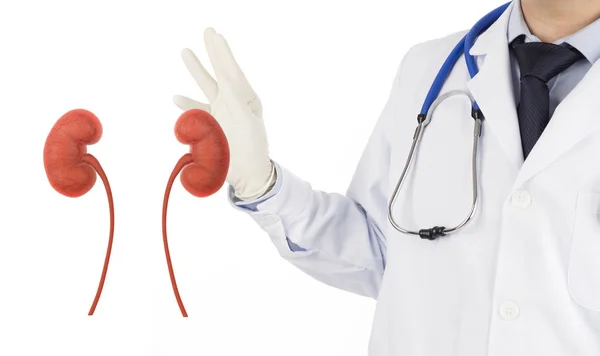03 Feb 2026
Rhinoplasty Revision Surgery in Mohali: Cost When Your First Nose Job Fails


Dr. Raka Kaushal
22 May 2025
Call +91 80788 80788 to request an appointment.
Kidney function tests are essential for assessing renal health and diagnosing potential kidney diseases. These tests provide crucial insights into how well your kidneys are functioning, helping healthcare providers identify issues early and mitigating long-term health complications. In this blog, we will explore key parameters of kidney function tests such as the Renal Function Test (RFT), Glomerular Filtration Rate (GFR), and creatinine levels, including their significance, normal ranges, and what the results mean for your health.
The Renal Function Test (RFT) is a blood and urine test that evaluates the kidneys' ability to filter waste products from the blood. It measures various substances, including creatinine, urea, electrolytes, and uric acid, providing a comprehensive overview of kidney health. The RFT is essential in diagnosing conditions such as chronic kidney disease (CKD), acute kidney injury, and other renal abnormalities.
Normal RFT values vary slightly based on the laboratory, but generally include:
For individuals in Punjab seeking RFT test centers, Livasa Hospitals offers comprehensive RFT assessments at all our locations including Livasa Mohali, Livasa Amritsar, Livasa Hoshiarpur, and Livasa Khanna, enabling residents to easily access vital kidney health services.
The Glomerular Filtration Rate (GFR) is a critical measure indicating how well the kidneys are filtering blood. GFR estimates the number of milliliters of blood that pass through the glomeruli, the tiny filters in the kidneys, each minute. It is an integral component of a kidney function evaluation, primarily based on serum creatinine levels, age, sex, and race.
GFR is categorized into stages to better understand kidney health:
| GFR Category | GFR (mL/min/1.73 m²) | Stage |
|---|---|---|
| Normal | ≥ 90 | Stage 1 |
| Mild Decrease | 60-89 | Stage 2 |
| Moderate Decrease | 30-59 | Stage 3 |
| Severe Decrease | 15-29 | Stage 4 |
| Kidney Failure | < 15 | Stage 5 |
For individuals in Punjab, understanding GFR categories is crucial. For more insights on GFR during a nephrology consultation at Livasa Hospitals, you will receive personalized evaluations based on individual health conditions.
Creatinine is a waste product generated from muscle metabolism and is usually filtered out by the kidneys. Measuring creatinine levels in blood and urine helps assess kidney function. Elevated creatinine levels indicate impaired kidney function or kidney damage, while normal levels suggest healthy kidney performance.
Normal creatinine levels generally fall within the following ranges:
Regular monitoring of creatinine levels is particularly important for those with risk factors such as diabetes, hypertension, or a family history of kidney disease. Consulting with a nephrologist at Livasa Hospitals can provide you with a profound understanding of your creatinine levels and renal health.

Several underlying conditions may lead to kidney dysfunction or failure. Understanding these factors can aid in early detection and intervention. Some common causes include:
Individuals at risk should particularly consider scheduling a kidney health checkup at Livasa Hospitals, where tailored nephrology consultations are available.
Early symptoms of kidney problems may be subtle but often include the following:
Recognizing these symptoms early is essential in preventing severe kidney damage. Consult a nephrologist for further evaluation if you experience any of these signs.
Besides kidney function tests, healthcare providers may utilize additional diagnostic methods to assess kidney health. These may include:
At Livasa Hospitals, we offer a comprehensive range of nephrology tests and advanced diagnostic techniques to ensure thorough assessments for our patients in Punjab.
Treatment for kidney disorders largely depends on the underlying cause and the severity of the condition. Some common treatment options include:
| Treatment Type | Description | Effectiveness |
|---|---|---|
| Medication | Medications to control blood pressure or manage diabetes. | High effectiveness in early-stage kidney disease management. |
| Lifestyle Changes | Diet modifications and regular exercise. | Highly effective for individuals with mild conditions. |
| Dialysis | A procedure to remove waste from the blood when kidneys fail. | Necessary for severe kidney failure cases. |
| Transplantation | Replacement of a diseased kidney with a healthy one from a donor. | Most effective for end-stage renal disease. |
Depending on the diagnosis, our skilled nephrologists at Livasa Hospitals provide personalized treatment plans that best suit individual health needs and goals.
Understanding kidney function tests such as RFT, GFR, and creatinine levels is crucial for monitoring kidney health. Early detection through routine screenings can prevent progression to severe kidney disease and enhance overall well-being. If you or a loved one is at risk for kidney problems or experiencing concerning symptoms, don’t hesitate to consult a nephrologist.
At Livasa Hospitals, we prioritize nephrology consultations to ensure comprehensive kidney assessments for residents across Punjab, including Livasa Mohali, Livasa Amritsar, Livasa Hoshiarpur, and Livasa Khanna. Taking charge of your kidney health can lead to a better quality of life.
Book a kidney health appointment with us today at Livasa Hospitals or contact us at +91 80788 80788 for more information.
Rhinoplasty Revision Surgery in Mohali: Cost When Your First Nose Job Fails
Plastic Surgery After Massive Weight Loss: Body Contouring Packages in Mohali
ENT + Cosmetic in Mohali: Septoplasty for Breathing with Cosmetic Rhinoplasty Offers
Livasa Healthcare Group Corporate Office,Phase-8, Industrial Area, Sector 73, Sahibzada Ajit Singh Nagar, Punjab 160071
| Mohali | +91-99888 23456 |
| Amritsar | +91-99887 49494 |
| Hoshiarpur | +91-99883 35353 |
| Nawanshahr | +91-75081 82337 |
| Khanna | +91-98888 05394 |